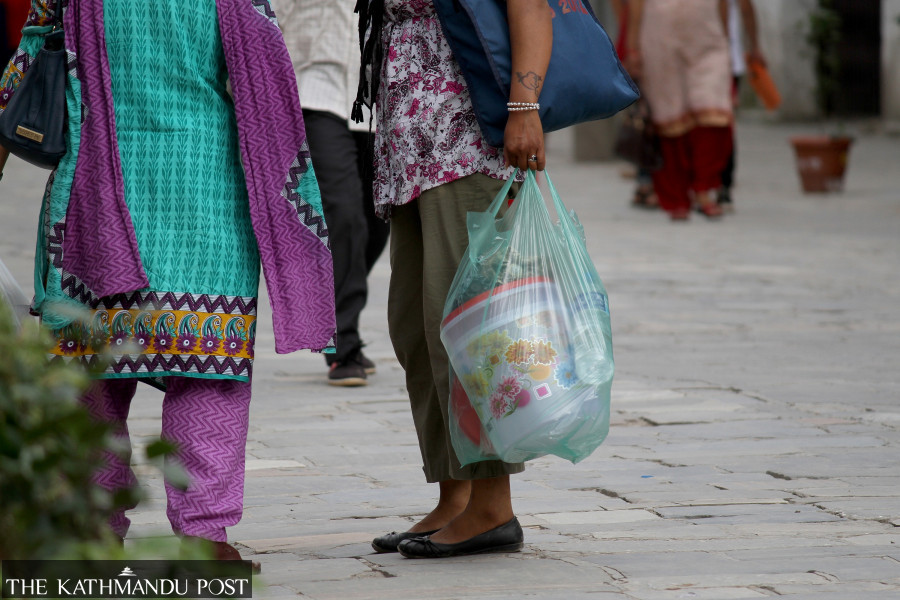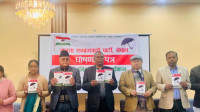National
Government reintroduces ban on plastic bags, but implementation remains doubtful
Many governments in the past came up with decisions to ban the use of plastic bags but none have been effective.
Anup Ojha
Sumana Gautam of Pepsicola, Kathmandu doesn't take any bags with her when she goes to the local market to shop for grocery items. She is also unaware of a government ban announced this week on plastic bags with thickness below 40 microns.
“I know plastic is harmful for the environment but it’s handy, and I have not seen any message from the government on social media or television informing the public about the new ban on polythene bags,” said Gautam, 37, a mother of two.
She said a few years ago she had heard about the government’s decision to ban plastic bags but not this time.
Four months after the then finance minister Bishnu Paudel’s announcement in the annual budget for the fiscal year 2021/22 to completely ban plastic bags from July 16, the Ministry of Forest and Environment under the Nepal Government published a notice in the Nepal Gazette on Monday about a complete ban in the production, distribution and use of plastic bags that are less than 40 microns thick.
This is not the first time the government has introduced a ban on plastic bags. Many governments in the past came up with decisions to ban the use of plastic bags but none have been effective.
After its several failed attempts at banning plastic bags earlier, the government this time has introduced a law to enforce the ban and published it in the Nepal Gazette on September 13, but there appears no mechanism to implement the ban.
“It’s already a law now and we must implement it. The ban is based on the Environmental Protection Act 2019 (2076), and it’s the right of every individual to live in a clean and healthy environment,” said Buddhi Sagar Paudel, joint-secretary and spokesperson for the Environment Ministry.
But when asked how that is going to be implemented, he didn't have a clear answer.
Plastic is a non-biodegradable material and most plastic is made from fossil fuels. If burnt, it poisons the air, if buried it pollutes the soil and plastic wastes dumped haphazardly have been clogging sewer mains and rivers, and polluting oceans. Nepal still does not have effective waste recycling plants although several private firms have been recycling solid waste and producing compost manure in small scales.
“It’s the three tiers of the government—central, federal and local—that should implement the ban. But plastic bags manufacturers have expressed their reservations about the ban,” said Paudel. He asked the Post to contact the Environment Division for details on how the ban is being implemented.
Earlier on April 1, 2015, the government had announced a ban on plastic bags that are smaller than 20 x 35 inches and thinner than 40 microns by publishing a notice in the Nepal Gazette. It also directed the authorities concerned to effectively implement the ban from the second week of April that year.
Soon after the enforcement of the ban, 20 factories, retailers, and wholesalers within the Valley were fined for breaking the law and 4,000 kilograms of plastic was confiscated, according to Rajeshwar Poudel, an environment inspector with the Department of Environment.
The ban had received public support in Kathmandu and government agencies and activists had started anti-plastic campaigns, but then on April 25, the country was hit by the devastating Gorkha earthquake and the ban was forgotten.
Environmentalist Bhusan Tuladhar says the main reason behind the non-implementation of the ban is due to lack of homework. “Before introducing such a ban, the government should hold proper discussions with the stakeholders including plastic bags manufacturers, users and the law enforcing agencies. Since that has not happened these bans are just limited to paper,” said Tuladhar.
Subsequently, the Nepal government in its budget speech for the fiscal year 2016-17 also talked about introducing a blanket ban on the use of plastic and polypropylene bags due to their undesirable impact on public health and environment, but that didn’t work. In fact, the government has been introducing such bans every year.
In mid-August, 2016, even the Supreme Court, responding to a writ petition, issued an interim order to the government to impose a complete ban on the use of plastic bags with thickness below 40 microns within three weeks, but the order went unimplemented.
“In our context the environment ministry publishes a notice but local bodies do not seem to be taking any initiatives to implement the ban. Many of the stakeholders seem uninterested in solving the problem,” said Tuladhar.
Although there had been demands from various sections of society for banning plastic bags, an organized initiative was started in November 2013 by a group of young volunteers working for the Himalayan Climate Initiative’s branch called Gen Nep. The group was able to garner 50,000 petitions in support of banning polythene bags.
“We can’t impose a blanket ban on plastic bags, but those less than 40 microns thick have been identified as the most polluting ones because they are not easy to recycle, so we are banning them,” said Indu Bikram Joshi, deputy-director general and also a spokesperson of the Environment Division.
According to the Division, the country has over 150 plastic manufacturing companies.
“We are working on an action plan and this issue is being discussed also at the Prime Minister’s Office. Once the action plan is ready, the ban will be implemented effectively,” said Joshi. He said a circular to the effect has been already sent to the District Administration Offices across the country through the Ministry of Federal Affairs and Local Development.
Being the country’s Capital and the largest city, Kathmandu produces a huge amount of plastic waste.
A 2018 report shows in Kathmandu people use around 4.8 million plastic bags daily—2.7 tonnes of plastic waste is produced daily here. It is learnt that around 16 percent of the garbage dumped on riverbanks and landfill sites is plastic.
Hari Shrestha, the chief of the environment division at the Kathmandu Metropolitan City says the ban will not be effective until the people are made aware of the environmental hazards caused by plastic pollution. “The City has been in constant touch with the central government and is also planning to encourage people to use reusable cloth bags or paper bags instead of plastic,” said Shrestha. He, however, said the City has not made any concrete plan for enforcing the new ban.
Meanwhile, plastic manufacturers say they were not consulted before introducing the latest ban.
“If the government is serious about banning plastic bags, it should start by restricting the import of raw materials,” said Probod Ghimire, owner of Shree Polythene and Plastic Udyog Pvt Ltd.
“The ban is impractical because the demand for thin plastic bags is huge. If bags thinner than 40 microns are banned then plastic bags will be costlier,” he said.
Tracing back the history of polythene bags, by 1997 they were widely consumed in Europe and were being supplied to the United States. In Nepal plastic bags started to replace older alternatives, such as paper and jute bags in the early 1990s.
For the past few years, a few supermarkets including Bhat Bhateni, Big Mart and Saleways have stopped issuing plastic bags to customers.
“But I am not optimistic that the ban will be effective until there is a concerted effort from all sections of society,” said Tuladhar.




 20.12°C Kathmandu
20.12°C Kathmandu.jpg)















